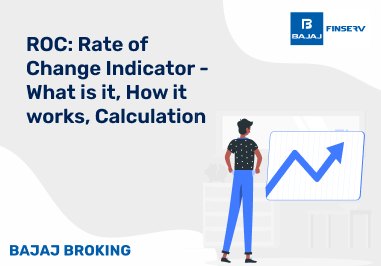Market indices are widely relied on by both investors and traders and serve as a reflection of the overall status of the stock market, or a segment of it. There are many market indices in India; some reflect the overall market, while others reflect a sector or segment of companies.
For seasoned investors or newcomers, taking note of market indices can help give you an understanding of the market behaviour, without the need to look at every single company in the market at that time. Market indices provide a quick snapshot and visual representation of the market as a whole, helping inform better investment decisions.
What is a Market Index?
A market index keeps track of how well the whole market or a certain group of stocks, bonds, or other financial instruments are doing. You make it by choosing a group of stocks that represent a part of the market.
For instance, a market index that shows the whole Indian stock market comprises companies from many different fields. If it simply looks at one sector, like banking, though, it will only include stocks from that sector.
The values of the securities that make up an index determine its worth. Some indices utilise market capitalisation as weights, whereas others may use revenue or share price. In India, the most prevalent way to measure market capitalisation is free-float market capitalisation, which only counts shares that are accessible for public trade.
Understanding Meaning of Market Indices
Market indices show how well a certain section of the market is doing. For instance, if you want to keep an eye on how well pharmaceutical companies are performing, it's far easier to follow the NSE Pharma Index than to look at a lot of different pharma equities.
Market capitalisation is the most common way to weight market indices. To make sure that only shares that are actively traded are taken into account, many indices in India use free-float market capitalisation. This strategy helps give a more accurate and real view of how the market is doing.
In brief, market indices make it easier to track the market, help investors see patterns, and serve as benchmarks for how well investments are performing.
Types of Market Indices in India
There are many market indices in India, and each one is meant to show a particular part of the market. The primary types are listed below:
a) Benchmark Indices
BSE Sensex and Nifty 50 are the two most famous benchmark market indices in India.
The Nifty 50 is a list of the 50 best equities from the biggest corporations on the National Stock Exchange (NSE).
The BSE Sensex follows the top 30 equities from the most important parts of the economy.
Both are well-known among investors and reflect the Indian business market as a whole.
b) Indices by sector
These indices stand for certain industries. For example:
The NSE Pharma Index shows how well the leading drug companies are performing.
The BSE car Index keeps track of equities in the car industry.
These kinds of market indices help investors figure out just how well a certain sector is doing.
c) Indices Based on Market Cap
Some market indices take into account the size of a company:
The BSE Large Cap Index is all about big corporations.
Nifty Smallcap 100 follows small-cap firms.
These assist investors in picking stocks depending on the size of the company and the level of risk.
d) Other Indices
Some indices include a lot of different companies. The S&P BSE 500, for instance, has 500 of the biggest and most commonly traded stocks, which gives you a good idea of how the market as a whole is doing.
What are the Major Stock Indexes in India?
If you want to register a demat account or start investing, you need to keep an eye on the main market indexes in India to get the best start in your investment journey:
a) The BSE Sensex
The BSE Sensex shows how well 30 significant, financially stable, and well-known corporations in India are doing. It uses the free-float market capitalisation method, which only looks at shares that are available to the public.
b) Nifty 50
The Nifty 50 is one of the most extensively followed market indexes in India. It contains 50 of the best firms from a variety of industries.
Indexes Based on Sectors
Other important market indexes are:
Nifty Auto is for car firms.
Nifty Bank is for equities in the banking industry.
Nifty Financial Services is for the money business.
Investors can learn how certain sectors are doing in the market by following these.
Why are Indexes Useful to Investors?
Market indexes make it easy for both new and seasoned investors to track and compare investments.
For instance, if you want to keep an eye on car firms, you would have to check Hero MotoCorp, Maruti Suzuki, Bajaj Auto, Tata Motors, and others every day. You can monitor how the whole sector is doing at a glance by following the Nifty Auto Index instead.
Market indexes are also good ways to compare how well mutual funds are doing. You can use the Nifty Bank Index to see how well your mutual fund is doing if it invests in banking firms.
Additional Read: What are Stock Market Indices?
Formation of an Index
There are a number of precise stages that go into making a market index to make sure it appropriately reflects a certain market or industry. This is how it usually works:
To make a market index, you choose a group of stocks that best represent the part of the market you want to study. The index provider then gives these stocks different weights based on things like how big the company is, how easy it is to trade, and how often it trades. The free-float market capitalisation approach is used by most of India's major market indices, like Nifty 50 and Sensex, to give weights.
Choosing Companies: Pick equities that are reflective of the sector or market you want to invest in.
Giving Weights: Use approaches like free-float or full market capitalisation.
Select a Base Year: Choose a base year correctly and base value (such 100 or 1,000 points) to use as a point of comparison.
Regular Review: The list of firms is checked on a regular basis to make sure the index is still correct and useful.
These techniques make sure that every market index accurately shows how things are going in the market right now.
Conclusion
Anyone who invests in the stock market needs to keep an eye on a market index. The Nifty 50 and the BSE Sensex are the two most important indices that measure the overall performance of the Indian economy.
Following the right market indices, like Nifty IT or Nifty Bank, can help you learn more about a specific sector, like IT or banking.
Even if you appreciate passive investments like mutual funds, it's still helpful to compare their performance to the right market indexes to see how well you're doing.














